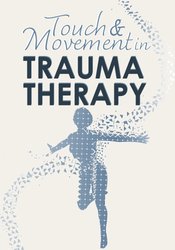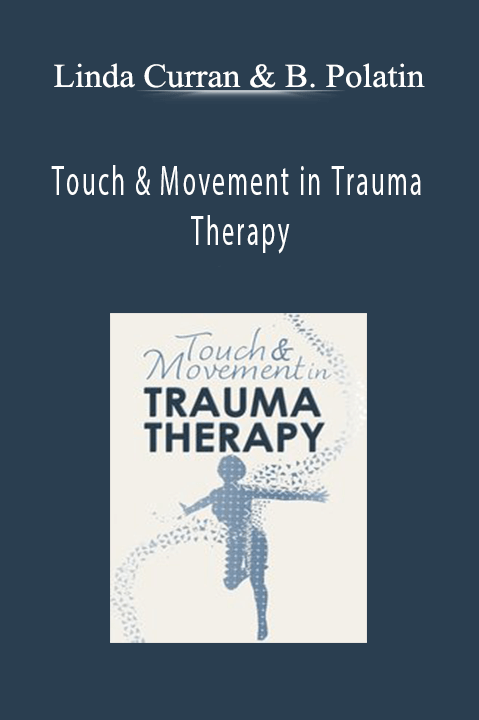-

Linda Curran, Betsy Polatin – Touch & Movement in Trauma Therapy
- Faculty:
- Linda Curran | Betsy Polatin
- Duration:
- 7 Hours 59 Minutes
- Format:
- Audio and Video
- Copyright:
- Jul 12, 2018
Description
When you think about your most traumatized clients, do you ask yourself “why are my clients stuck?” or “why aren’t they getting better?”
Trauma affects the mind, brain and body. Successful therapy requires interventions that address all three – interventions that heal the autonomic nervous system and those that address the body and internal organs as well. How many of these are you using with your clients?
Join movement specialist and author of The Actor’s Secret, Betsy Polatin MFA, SEP, and trauma specialist Linda Curran BCPC, LPC, CACD, CCDPD, and learn to address trauma in a bottom-up fashion. You will gain techniques and resources that address sensory, motoric and somatic issues and encourage clients to turn their attention towards the internal sensations of position and movement, bodily pain, and sensing one’s internal state. You will be able to implement sensorimotor and somatic interventions, including those adapted from the Alexander Technique and the Feldenkrais Method, Gestalt therapy, Yoga, sensory integration methods, therapeutic touch and breathwork.
This workshop teaches a plethora of relatively simple, yet theoretically sound, body-based techniques for healing simple, complex, and developmental trauma.
Are you ready to take your trauma intervention toolbox to the next level? Register today and start on your journey to more positive outcomes for your most traumatized clients.
Handouts
| Manual – Touch & Movement in Trauma Therapy (3.5 MB) | 27 Pages | Available after Purchase |
Outline
Introduction to Betsy Polatin & Performance Training
Do Our Intentions Match the Results?
Entrenched Patterns
Performance & Trauma
Somatic Experiencing
- Allowing Our Bodies to Complete a Response
- Understanding Our Patterns
- Letting Go of a “Character”
The Actor’s Secret: A New Approach to Performance Training
The Alexander Technique
- The Importance of Support
Breathing Coordination
- 3 Dimensional Breathing
Somatic Experiencing
The Importance of Movement
How Do We “Use” Ourselves
Effort & Energy
- Can You Do Less?
- Toned But Not Tense
Client Demonstration
Touch & Movement
The Roles We Play
Changing Habitual Patterns through Touch & Movement
Resourcing
- Internal Resources
- External Resources
Experiential Exercise: “Resources” & Discussion
Trauma 101
“What Happened to You” vs. “What is Wrong With You”
Peter Levine’s View of Trauma
The Brain in the Palm of Your Hand (Dan Siegel)
- Interpersonal Neurobiology
Overwhelm/Shutting Down
Gestalt Therapy
The Arousal Cycle
Experiential Exercise: “Startle Exercise”
- Reset Breath
Orienting: Betsy Polatin
- Living in the Present vs. the Past
- Experiential Exercise: “Orienting”
- Orienting Demonstration
- Differentiating
The Autonomic Nervous System: Linda Curran
- Stephen Porges: Polyvagal Theory
- Tend/Befriend
- Fight/Fright/Freeze
- Collapse (Dorsal Vagal Response)
- The Levels of Physiological Arousal
- Experiential Exercise: “Tracking”
- Reptilian Brain (Sensations)
- Limbic (Feelings)
- Cognitive (Thinking)
- Containment & Support
- Tracking Demonstration
Stress Response
- Stress Event/Reaction
- Discharge Energy
- Equilibrium/Baseline
Freeze Response
- Sympathetic vs. Parasympathetic
- Defense Cascade
- Tonic Immobility
- Robert Scaer M.D. Interview
Regulation
- Interpersonal Regulation
- Self-Regulation
Experiential Exercise: Interoceptors & Discussion
Use of Self
“How” vs. “What” You Do
Definition of “Use”
Two Concepts
- Support
- Suspension
Demonstration: “Support”
Wrap Up & Conclusion
Awareness through Movement Feldenkrais Method
Hands on Method
Awareness through Movement Lessons
Human Brains Organized Towards Efficiency, Healing, and Functional Organization
Trauma & Awareness through Movement
- Shift Self-Awareness in the Body
- Effect on Nervous System
Experiential Exercise
Touch “When & Why”
Harry Harlow Study
- Neglect & Attachment
- Importance of Touch
Touch & Resonance
- Asking Permission Before Touching
Experiential Exercise: “Energetic Boundaries” & Discussion
Two Types of Touch
- Practitioner Hands on “to fix”
- Non-Fixing Touch
3 Ways of Approaching Touch
- Merging Touch
- Barely Touching
- Agency Touch
Experiential Exercise: “Hands On” & Discussion
Touch & Trauma Treatment
- Support
Communication about Touch
Experiential Exercise: “Get a Pen” & Ethical Decision Making Worksheet & Explanation
How to Communicate When We Don’t Want to be Touched
How Essential Touch is to Our Well-Being
- Skin Hunger
Boundaries
- Letters to Body Workers Regarding Touch
Suspension
Suspended From Above
Two Systems
- Compression System (Building Blocks)
- Suspension System (Expansion)
Body Alignment: Suspension System
Tensegrity
Experiential Exercise: “Suspension” & Discussion
Grounding
Introduction
Review of Ethical Decision-Making Worksheet
Follow-up: Letter to Body Workers
Working with Flashbacks
Guided Imagery is the Opposite of Flashbacks
Experiential Exercise: Guided Imagery: “Lemon Experiment” & Discussion
Breathing
Review of Suspension & Support
Carl Stough “Breathing Coordination”
- Proper Breathing Requires Attention
- Breathing Coordination Used to Reverse Emphysema
Different Models of Breathing
- Diaphragm Breathing
- Belly Breathing
- 3 Dimensional Breathing
- Sideways
- Up & Down
- Front to Back
Experiential Exercise: “3 Dimensional Breathing” & Discussion
Collapsed vs. Empowered Stance
Experiential Exercise: “Collapsed vs. Empowered Stance”
Dual Awareness
- Helping Clients be Aware of their Stance
- Helping Clients be Aware of their Emotions
Autonomic Nervous System
- Volitional Control
Dissociation
- Goal: Become Embodied & Present
Mentor: Mary Lou Schack, Ph.D.
Problems Have a Traumatic Base
Experiential Psychotherapy Session with Dr. Schack
Processing the Session
- Four Reactions to Trauma
- Fight
- Flight
- Freeze
- Find a Friend (Basic Human Instinct)
- We’re Traumatized Because We Don’t Believe we Can Get Help
Awareness & Alexander Technique: Betsy Polatin
Experiential Exercise: “50/50 Awareness”
- 50% Awareness in on the Inside
- 50% Awareness in on the Outside
Experiential Exercise: “The Chair” with Betsy Polatin
Alexander Technique
- Experiential Exercise: “Can I Do Less?” & Discussion
- Knowing our Own Patterns
- Being Able to Shift Your Patterns
Embodied Self: Linda Curran
More about Betsy Polatin’s Background
- Dance
- Vocal Coach
- Movement, Trauma & Experience
- Working with Peter Levine
Wrap Up & Conclusion
Relationships before Touch
The Language of Trauma is Sensor
Faculty

Linda Curran, BCPC, LPC, CACD, CCDPD Related seminars and products: 14
Linda A. Curran, BCPC, LPC, CACD, CCDPD, EMDR Level II Trained, is president of Integrative Trauma Treatment, LLC in Havertown, PA. She provides clients an integrative approach to trauma, and treats PTSD in adolescent and adult populations, including clients with eating disorders, sexual trauma, and self-injury. An international speaker on the treatment of trauma, Linda has developed, produced, and presents multi-media workshops on all aspects of psychological trauma.
Linda is the author of the best-selling Trauma Competency: A Clinician’s Guide (PESI, 2010) and 101 Trauma-Informed Interventions: Activities, Exercises and Assignments to Move the Client and Therapy Forward (PESI, 2013). She is the producer of the best-selling Interview Trauma DVD series in which she collaborated with the world’s leaders in Trauma: Bessel van der Kolk, M.D.; Peter Levine, Ph.D.; Babette Rothschild, MSW, LCS; Stephen Porges, Ph.D.; Janina Fisher, Ph.D.; and many more.
Speaker Disclosures:
Financial: Linda Curran maintains a private practice. She receives a speaking honorarium from PESI, Inc.
Nonfinancial: Linda Curran has no relevant nonfinancial relationship to disclose.
Betsy Polatin Related seminars and products: 1
Betsy Polatin maintains private practices in Brookline, Massachusetts and the Berkshires, and often teaches in New York and London.
She pioneered a four-year Alexander Technique curriculum for the acting conservatory students at Boston University’s College of Fine Arts, where she continues to teach today.
In addition to Boston University, Betsy is on the faculty at the Opera Institute of Boston. She has also taught at: The Tanglewood Summer Music Program, Berklee College of Music, The Muscular Therapy Institute, New Hampshire Music Teachers Association, The Kushi Institute, and Boston Ballet through the Dance and Sports Medicine Clinic at Children’s Hospital run by renowned orthopedic surgeon Dr. Lyle Micheli, M.D.
Betsy has taught master classes to The Pittsburgh Symphony Orchestra, Children’s Hospital Physical Therapists, Cambridge Choir of England, Northeastern Society for Group Psychotherapy, The American Red Cross, Saint Francis Friary and Yoga and Meditation centers. She has taught throughout the U.S., and the world, including India, Japan, England, Germany, Spain, and Korea.
Articles that Betsy has written about the technique have been published in Direction Magazine, and in 2009, she presented her work at the 7th International Conference for the Alexander Technique at Oxford University.
Betsy recently did Alexander Technique and vocal coaching for jazz singer and saxophonist Grace Kelly on her new CD, “Man with the Hat”, recorded with Phil Woods.
Instant Access Available
Downloadable Content
Get Instant Download Linda Curran, Betsy Polatin – Touch & Movement in Trauma Therapy at Offimc.click Now!
Sale Page: https://catalog.pesi.com//item/touch-movement-trauma-therapy-49461
Delivery Information
- Upon ordering the product, a delivery email with download instructions will be sent immediately to you so that you may download your files. If you log in (or create an account) prior to purchase you will also be able to access your downloads from your account dashboard.
- It is a digital download, so please download the order items and save them to your hard drive. In case the link is broken for any reason, please contact us and we will resend the new download link to you.
- If you don't receive the download link, please don’t worry about that. We will update and notify you as soon as possible from 8:00 AM – 8:00 PM (UTC+8).
- Please Contact Us if there are any further questions or concerns you may have. We are always happy to assist!







7 reviews for Touch & Movement in Trauma Therapy – Linda Curran, Betsy Polatin
There are no reviews yet.